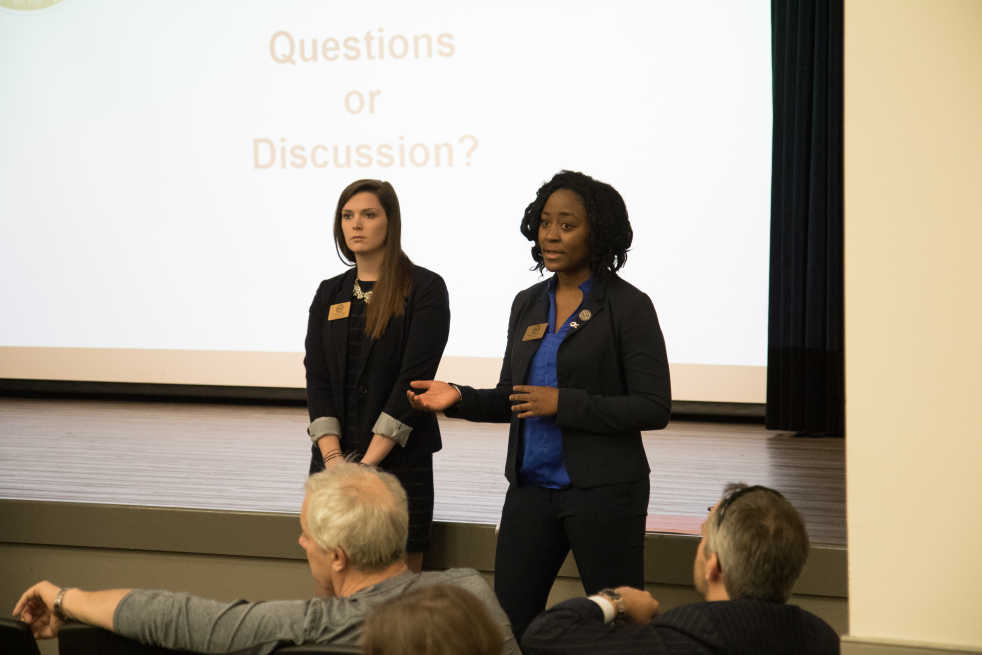Tech’s Faculty Senate met for the first time in 2017 on Valentine’s Day, providing updates to faculty representatives and taking action on several items of interest to the Tech community.
The meeting began with remarks from President G.P. “Bud” Peterson, who gave updates on happenings at Tech as well as relevant legislative works in progress.
A key initial focus of Peterson’s remarks was the ENGAGE program, a recently-announced initiative between Tech and the city of Atlanta and the Atlanta Committee for Progress to foster start-ups in the area.
“It will be a fund that will allow the Board of Directors, which is comprised of a member from each of the ten companies, to direct funding at the startup companies. … We anticipate opening it up to other investors in the not-too-distant future.
“The legislature is in session, and a lot of the issues we saw last year have reappeared: guns on campus [for example]. One bill has been introduced that would allow individuals to carry a gun on campus whether they have a permit or not,” Peterson said. “It’s not clear how that would pertain to people under the age of 21; … this is kind of a wide-open bill. The bill has resurfaced but with a restriction on childcare centers.
“House Bill 51, which would prohibit universities from investigating sexual assault unless the victim has filed charges with the local district attorneys, has actually been in committee. From my personal perspective, a lot of positive changes were made to that bill but it’s still got some issues. The religious freedom bill is probably going to resurface, we’ve got legislation on tuition caps that would take away the ability to adjust tuition away from the Regents and vest it with the legislators, tying it to the cost of inflation. There’s a lot going on in the legislature downtown and we are watching a lot of that very closely.
“And then you couple that with what’s going on in D.C. and it is a very, very fluid situation. Certainly the executive order on immigration created a lot of national news. … We are watching that very closely, but again it is a very fluid situation that seems to change almost daily.
“We’re trying to track that and continue to watch it. The Office of International Education is trying to work with our international students, faculty and staff to try to help them understand what’s going on and what the potential ramifications are. We’ve held a number of workshops with the international students to try to help them [understand] to the extent we can what the situation is and actions they might or might not want to take.”
Nagela Nukuna, Undergraduate Student Body President, made a presentation to faculty representatives regarding a recent Student Government Association (SGA) initiative to alter how data from the Course-Instructor Opinion Survey (CIOS) is used and disseminated. Accompanied by Lindsey Eidson, fifth-year CS major and SGA Vice President of Academic Affairs, Nukuna laid out plans for a policy alteration in which numerical CIOS data would be released on Course Critique and written feedback would be released to Deans and heads of respective schools.
“The three stakeholders who are really important when we’re talking about the CIOS are the instructors, the administrators and the students,” Nukuna said. “We’re going to focus on the students here — currently students do not have access to any kind of CIOS data whatsoever, whether that’s numerical data or the [written] comments. What we are proposing is that we receive portions of that numerical data.”
“Course Critique was not initially designed to house CIOS data, it was designed to house GPA results,” Eidson said. “However, students and especially undergraduate students when scheduling take into account both the time [commitment] and the GPA for the professor.
“We want to append columns to the current version [of Course Critique]. The columns we want to append are ‘hours spent on course,’ ‘how prepared you were for the course,’ ‘degree to which activities facilitated learning’ and ‘effectiveness of the course.’”
“[We want to address] the idea that keeping comments away from Deans and Chairs originated from concerns about using comments against professors in some way,” Nukuna added. “This is a very valid concern and something we’ve thought a lot about. One of the things that came up when we were talking about this is the idea of accountability. … Viewing the comments does not mean that they will be used against you. Basically, if you are a school chair and you see that a professor has an average of threes or fours, you do not know where they can improve because you do not have the comments to color that data.”
Other action items covered at the meeting included course and certificate approvals as well as the approval of two new subject codes: SLS, referring to interdisciplinary Serve-Learn-Sustain courses, and VIP to distinguish courses which are part of a vertically integrated projects. Policies to refine Tech’s leave of absence policies and readmission policies were also approved by the Senate.
